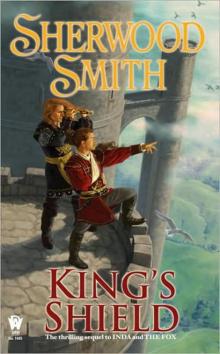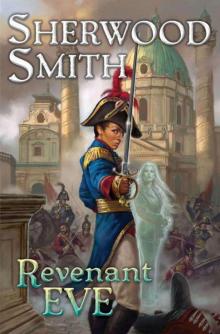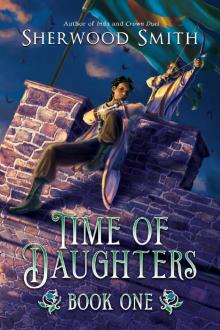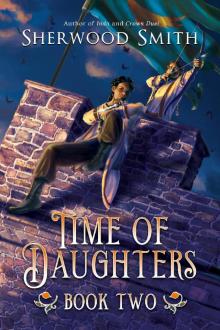- Home
- Sherwood Smith
Sasharia en Garde Page 15
Sasharia en Garde Read online
Page 15
I whistled. “Now that I know what your invitation is worth, I thank you again.”
She squinted upward, frowned at something going on with one of the upper sails, and pushed away without another word, swarming up the shrouds like she was flying.
By nightfall we were skimming northward at exhilarating speed. The sky was clear, the air balmy. Three of the day crew brought out instruments, sat on the railing of the forecastle half-deck, and began to play. Some of the crew sang songs in round, in which I could hear the difficult but distinctive Sartoran triplicate chord changes and beats. The teenaged crew members started dancing in twos and threes on the forecastle, one boy alone on the capstan, blithely ignoring jeers and even a couple of metal ale cans potted at him, which he dodged without missing a step.
Owl stumped up beside me. “C’mon, Princess, give us a dance.”
“Not much of a dancer.” I grinned. “I’m afraid if I get up there and swing my hips around like people my age do at home, every single ale pot would be tossed at me.”
“You get up there and swing them hips, and they won’t be tossing ale pots.” He wiggled his slanting brows.
That made me laugh, but I (easily) resisted the temptation to make a fool of myself.
Zathdar appeared at my other side. I was leaning against the rail with my elbows propped behind me. He leaned next to me, his profile etched against the taut foresail as he watched the dancers jig and twirl round and round the capstan. But I could feel his attention on me. He asked in his mild voice, “No dancing?”
“I’m afraid of what it says about my upbringing that I wouldn’t know what to do at a grand ball, but put me on a dojo floor and I’m ready to rock and roll.”
Dojo and rock and roll did not translate, but he didn’t question either of them.
I said, “So did you have a pirate mom or dad?”
He looked up in mock exasperation. “How often do I have to remind you that I’m a privateer?”
“Who dresses like a pirate.”
He angled that quick grin again, the dimple accentuated by the golden light of the swinging lamps overhead. I was vaguely aware that Owl had gone from my other side.
“A pirate,” I added firmly, “who has no sense of color.”
He put his hand to his bandana, which was the long green-and-gold one hanging down his back, the fringes blowing around his slim waist. “Who says green and red is not eminently sensible? Why, in the worst rainstorm, in the thickest action, Owl and Robin only have to look round once and find me anywhere.”
“Including in nightmares.”
There was the dimple again. I looked away, but I was laughing.
I heard his laugh, a soft chuckle, almost under his breath. His elbow companionably bumped against mine as the ship lurched, and again the fire of attraction crackled through me. But he made no moves.
“Here’s an added boon. With this crimson shirt, see, if someone nicks me it doesn’t show. I can lie and gloat that they missed. Protect my rep that way.”
I laughed again. It was an unguarded moment, at the end of which our eyes met, and his smile turned pensive, his gaze held mine—light blue as the water under a guileless sky—and I had to exert all my will to look away, or drown.
Yeah. I know it sounds stupid, but I really did feel like I couldn’t breathe. My nerves flashed hot and cold, my entire body tingling with proximity, with possibility. But I looked away, and as the feelings settled down to the glow one gets when the physical self—whose needs are as simple and direct as those of the creatures around us who do not speak—recognizes equal attraction.
Zathdar said, “With this wind, we’ll make landfall day after tomorrow before dawn, on the early tide. I suggest you disembark with the cargo and make your way into the town on the other side of the brewery. If you like, I’ll meet you at the Gold Inn, which is run by the brewers. I’ll give you any news I discover. That should arm you for whatever you decide next.”
“Thanks,” I said to the planking of the deck.
When I breathed again, he was gone. I lifted my head in time to see him duck under his cabin door, fringes rippling in the wind.
Owl drifted up next to me. “Why don’t you go after him?”
He was so direct yet managed to be so unconfrontational I was not tempted to say, Why don’t you mind your own business? as I might have to anyone who sneered or leered or made some sort of innuendo.
I said, “You have your life here on the sea. Not for me to say if it’s right or wrong, but it’s not really mine. I have to find out what mine is.”
“You don’t want to try to find it here?” Owl raised a scarred hand. “Cause is a good one. More than that, or maybe less, I’ve never seen him tempted to break his own rule before.”
I remembered what Gliss had said about his not being involved with crew.
“Maybe that’s why I should go away.” I tried to summon a smile, but Owl squinted at me, not smiling back.
My mother said when I was about sixteen: Here’s the truth of my experience. Attraction happens, and it’s glorious and good when it happens back. For a short time if the body has picked a bore or a brute, long if the mind and the heart can also match. Because attraction, though it might seem to change the world, is not love. Love is the match of all three. Body. Mind. And spirit.
How could I find a meeting of the minds with a pirate—or privateer—without talking myself into that life, at least for a time?
I faced Owl. “Whether bad or good I cannot say, but I do know a lawless life on the sea is not my future. And I’m not the kind who can have a fling then leave without a second thought.”
He looked up at the sails then back at me, his narrow jaw working. His ruby-set golden earring, won in pirate battle, glinted against his jawline, emphasizing some tension, perhaps some unspoken thought. “Fair enough.”
The armorer was singing a bawdy song in a sweet, soulful tenor when I retreated to my cabin. I lay on my bunk, hands crossed behind my head, watching the light-stippled reflections of water on the ceiling of the cabin as bare feet danced on the deck overhead far into the night.
o0o
On the day of our landing, I woke to the sound of bawling commands and busy hammers and saws coming through the open scuttle. Not our ship. In the mellow blue-gold light of dawn, a big brigantine slid by, its deck and masts alive with an enormous crew all busy.
I got up. Elva was already gone, her bunk made. I hauled all my bedding down to the cleaning frame, put it through, and lugged it up again to make my bunk neat. When I stepped out, once again the ship wore a disguise, this time as a slightly down-at-heels merchant. Our masts were stumpy, a single sail on each. The barrels (most of them empty) neatly lined the rail. The crew all wore dull variations on homespun shirts and brown-dyed deck trousers.
Everyone was quiet, self-absorbed. I found Elva sitting on a barrel and joined her, turning my attention to the busy harbor as we threaded slowly through ships of every size and type, each a little world filled with people busy doing things.
“This is Ellir?” I asked.
She pointed at the martial outline of a fortress topping the ridge of hills behind the port. “That’s the garrison and also the academy. Supposedly—”
“I know, belongs to Prince Jehan. Whenever you start with ‘supposedly’ I know Canary’s son is fumbling around somewhere behind.”
She grinned. “Well, truth is, he does seem to preside, though I understand it all is really run by Captain Randart, the war commander’s brother.”
“Yuk. More Randarts? Ugh.”
“I didn’t even mention War Commander Randart’s nephew Damedran, who’s supposedly the best of the academy cadets. Devli says the mages all think Randart wants Damedran as heir instead of the Fool. Except that Randart defends the Fool. Which is another thing against him.”
“That doesn’t make sense. Canardan is the king, right?”
Elva said soberly, “Yes, but whatever Randart wants, he gets. There was suppose
d to be no killing, that was promised. Yet Randart was angry when they didn’t catch your father, and so he made sure Magister Glathan died. He broke his word to do it. Had the magister shot in the back. Bolt from a crossbow. Right after making a truce.”
Magister Glathan—dead?
My father had to be either dead or imprisoned by his last-resort spell. A spell he could not free himself from.
That meant I was the only one who could free him.
If he lived.
I grimaced. Magister Glathan was a vague memory, but he’d been kind and patient with me, and I remembered how much my father and he had talked, how much my father had admired the mage. “That’s horrible.”
“Anyway, no one knows what Randart wants, except Randart. We’ll find out when he gets it.” Elva rubbed her arms just above the elbows. “I wonder what can be taking Devli? It’s like he married those messmates of his. Never was away from them once, yesterday.”
“Where is the brewery?”
“See that big stone building up at the very far end of Market Street? Market Street starts at the base of the main pier, which is just past where that yacht is docked.”
I peered under my hand, and whistled. “That’s gorgeous. I’ve never seen such a beautiful yacht.”
“It belongs to the Fool,” Elva admitted.
“I thought someone said he gets seasick.”
“The king gave it to him. He’s seldom on it, and only long enough to entertain some of his artists.” Elva waved a dismissive hand. “But he has a crew complete with a Colendi cook just sitting around waiting all the same. Anyway, you can see how Market Street runs along the foot of the ridge. See the academy on top of the ridge? The brewery is right below the far end of the academy. Sometimes when the wind comes off the land, you can smell the malt being made from the barley.”
“Does Prince Supposedly run that brewery, too?”
She looked surprised. “You didn’t know? It’s entirely run by old sailors. If you get wounded young and can’t sail, you have a place there if you want it.”
“Beer made by drunken sailors?”
“Oh no! No one is more serious about brewing than an old sailor. Drink a drop on duty and you’re out. Which is why Gold is the very best. Ships come here from all over the continent for the year-ale, the darkest. Best barley from the hills, best hops, everything the best.”
“So the Gold Inn is good?”
“The food is great. You should have their corn muffins, all slathered with honey-butter . . .” She sighed. “Why, you going there?”
“Zathdar said he’d meet me there, if he hears any news concerning me, and I could go on my way. I thought that pretty nice of him.”
She pursed her lips. “I think it pretty crazy. He’s probably the most wanted person in the kingdom, and War Commander Randart, they say, would pay almost anything in reward money to lay him by the heels. I thought he’d stay hidden below while we’re here.”
“Well, the offer is all the more admirable,” I said, lightly enough.
She frowned at me. “But you can’t be going like that.”
“Like what?” I fingered my braids. “Oh. Right. I never thought of that.”
“I’m sure someone here will at least give you a bandana for the hair.” She paused, frowning again, and stared up at the castle all along the ridge, the stone lit with mellow color by the rising sun behind us. “No, I’m sick of everyone yatching at me about my guesses,” she muttered. “Never mind, I’ll just check on my own. Here’s the important thing right now, you do need a disguise.”
The bosun tweeted, causing a stampede of running feet. The masts creaked, sails loosened, whacketted, and slumped. A crew got the anchor atrip, then on command let it go. Underneath us the chain roared until the ship jerked. The anchor was down. We stopped moving, except on the gentle swell.
While the sails were bunted, the anchor crew began booming the longboat over the side. I went below for the last time. The sail mistress had told me that I could have anything but they usually traded, and so I left my Earth clothes. I didn’t want the extra weight, I couldn’t wear them, and they didn’t mean anything to me. Let some pirate puzzle over a T-shirt with Got books? on it.
I picked out a sturdy forest green tunic that came down to my knees, below which I wore the deck trousers I’d been given, and found some castoff mocs that fit. I donated my sandals. Maybe someone would think the Earthwear an exotic fashion touch. I chose an old floppy sailor’s hat that someone had abandoned. It not only hid my hair but half of my face.
By then the boat was lowered, and the ship boy on duty came shyly to offer me a ride in the first trip.
I reached the rail and looked back at the deck. Some of the crew waved, and one or two saluted. Zathdar was not in sight.
I waved, tucked my gear back under my arm, and clambered down the side to drop into the boat. I thumped clumsily onto the sternsheets and sat with my gear bag in my lap as the crew took up oars and rowed for the passenger dock.
Chapter Sixteen
Go and find her with your good will—and your worst spies.
Atanial did not say that out loud. She was not certain how much real freedom she had or what Canary might do if she broke the appearance of a truce.
She did know that if she left, it would either be under guard, or else he’d have people following her.
So she smiled sweetly at King Canardan. She smiled sweetly at the two big guards who escorted her back to her chambers when Canary regretfully excused himself to his day’s work.
Back in her room she flung the brass jewelry holder against the fireplace stone, counting under her breath until a maid came running in, and she smiled sweetly at her.
Five seconds. The listening ears were close.
Atanial knew better than to confront the servants. They were doing what they were told, whether by will or coercion right now did not matter. “Oops.” She picked the brass plate up. “I dropped it.”
She set it carefully on the carved wooden bureau, next to the pretty ceramic vase that she would have loved to smash. But she couldn’t bring herself to indulge her temper that far. At home, where things were manufactured, maybe. Here, human hands had shaped this vase, and another pair of hands had painted the intertwined ivy leaves all around it. If she did any dropkicking, it would be the seat of Canary’s fine linen trousers. Or better yet—
“Is Commander Randart anywhere about?” she asked.
The maid’s eyes widened, and Atanial realized that not only was she being watched, but every question had to be reported.
“I wanted to ask him if I could witness a military review.” Once again Atanial summoned up her sweetest smile, though by now her face ached. “I used to adore watching those handsome young things march about.”
“I can ask, your highness.” The maid curtseyed, her eyes frightened at the mental echo of Randart’s name.
And by noon the word came that Canary was going to escort her himself to review the midday change of the palace guard.
So they stood there side by side on the rampart above the great parade court and looked down at all those earnest-faced young men and women sweltering in their faultless battle tunics, and Atanial thought, Yes, I’m getting the message about who holds the reins here.
But again she smiled sweetly as they marched, did an impressive sword form, and presented their spears. And that sweet smile was ready and at her command when the king escorted her down the stairs to walk along the row on close inspection. She forced Canary to stop every so often, while she asked harmless questions: How long have you been in the guard? Where do you hail from? She took care to listen to every answer as if her life depended on it, and she looked into every pair of eyes, willing the person behind them to see her. She thanked each speaker as if they’d given her wings.
And maybe they would, despite the fact that she did not see Tam among them. Someone would have to help her. She needed to figure out who and how, without endangering anyone, because two th
ings were immediately clear: one, she had to get away; and two, she was about ten years past vaulting over ten-meter walls and castle rooftops in order to do it.
So the next best thing was to get to know as many people as possible—and inspect the castle to see what escape hole might exist.
She ate alone. Neither king nor queen came near. Someone had placed some books in her sitting room—every single one at least a century out of date.
But old as they were, those books still reminded her of the third option, the one she tended to forget because she didn’t understand it.
Magic.
She read until the midnight bells rang, then withdrew into that splendid marble bath, locked the door, and glanced at the scented, slightly steaming water.
First things first. She dug the transfer token out of her bra and examined it closely. There were no more Gate transfers left on it. Whether one person or two came through, the transfer energy was spent. That much she knew, for Math had told her as much before their parting.
The question was, did the transfer use up all the magic, or could the thing still sense wards? She’d been told not to risk using the token if it sensed other magical presences around it. She held it up, remembering how Math and (at first reluctantly) Glathan had tried to convince her that magic was not the equivalent of electricity. Magic existed somewhere in the interstices between light and molecular movement, but she thought of it in terms of battery storage and voltage and switches. It was the only way her mind could comprehend what it could do, if not what it was.
She walked around the bath with the token, and noticed a tiny flicker of light around its edges, in response to the water cleaning spell. Ahah. So it did work. And what’s more, she had wards around her, of some sort.
More than that she could not tell. It hurt unexpectedly, remembering Math’s childlike glee when she showed a modicum of ability with some little magical trick, now forgotten. His Albert Einstein hair seemed to bristle and crackle with his delight. But tempering that had been Glathan’s obvious distrust during those early days, when they first came through the Gate. Later that altered to grudging acceptance, and finally to a truce, and even a measure of trust.

 Inda
Inda Danse De La Folie
Danse De La Folie King's Shield
King's Shield Whispered Magics
Whispered Magics Fleeing Peace
Fleeing Peace Barefoot Pirate
Barefoot Pirate Crown Duel
Crown Duel Mearsies Heili Bounces Back
Mearsies Heili Bounces Back Commando Bats
Commando Bats A Stranger to Command
A Stranger to Command Lhind the Spy
Lhind the Spy The Spy Princess
The Spy Princess Blood Spirits
Blood Spirits Sasharia en Garde
Sasharia en Garde Lhind the Thief
Lhind the Thief Paradise Drift
Paradise Drift Banner of the Damned
Banner of the Damned The Trouble With Kings
The Trouble With Kings Poor World
Poor World Treason's Shore
Treason's Shore Wren Journeymage
Wren Journeymage A Posse of Princesses
A Posse of Princesses Revenant Eve
Revenant Eve Once a Princess
Once a Princess Time of Daughters I
Time of Daughters I Rondo Allegro
Rondo Allegro Coronets and Steel
Coronets and Steel Over the Sea
Over the Sea Senrid
Senrid Hunt Across Worlds
Hunt Across Worlds A Sword Named Truth
A Sword Named Truth The Fox
The Fox Twice a Prince
Twice a Prince Fair Winds and Homeward Sail: Sophy Croft's Story
Fair Winds and Homeward Sail: Sophy Croft's Story Time of Daughters II
Time of Daughters II The Rifter's Covenant
The Rifter's Covenant The Phoenix in Flight
The Phoenix in Flight Stranger
Stranger The Thrones of Kronos
The Thrones of Kronos A Prison Unsought
A Prison Unsought Twice a Prince: Sasharia En Garde Book 2
Twice a Prince: Sasharia En Garde Book 2